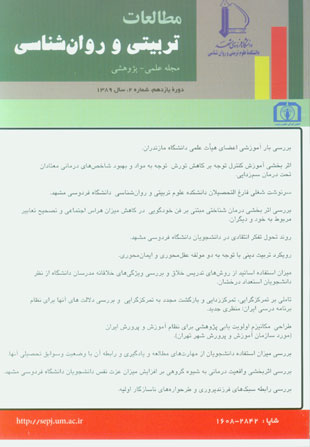Comparison of Explicit Sequence Motor Learning in Youth and Elderly
Author(s):
Abstract:
Motor sequence is bases of much of human intelligent behavior. It is because of such sequential skills involved chaining a number of primitive actions together. Cognitive aging is the part of aging that cause decrease cognitive ability of elderly such as learning. The purpose of this research is comparison of explicit learning in youth and elderly. Soft ware of serial reaction time task is used for sequence learning. This software registers errors and Response Time (RT) in response to sequential stimulus. We compare youth (N=15) and elderly (N=15) in two groups. The task defines in 10 blocks that the first and the sixth blocks where random and the other blocks were sequential. ANOVA for compare response times and errors in different blocks and paired T Test for compare regular and irregular blocks and independent T Test for compare youth and elderly is used. Result show that in youth and elderly RT decreases in regular and irregular blocks. Errors in youth is lower than elderly. RT decreasing in elderly is lower than youth. As frontal lobe is affected in explicit learning and in aging process frontal lobe is more deteriorate than other brain part. The explicit learning in elderly is less than youth.
Language:
Persian
Published:
Studies in Education and Psychology, Volume:9 Issue: 2, 2009
Page:
113
magiran.com/p608535
دانلود و مطالعه متن این مقاله با یکی از روشهای زیر امکان پذیر است:
اشتراک شخصی
با عضویت و پرداخت آنلاین حق اشتراک یکساله به مبلغ 1,390,000ريال میتوانید 70 عنوان مطلب دانلود کنید!
اشتراک سازمانی
به کتابخانه دانشگاه یا محل کار خود پیشنهاد کنید تا اشتراک سازمانی این پایگاه را برای دسترسی نامحدود همه کاربران به متن مطالب تهیه نمایند!
توجه!
- حق عضویت دریافتی صرف حمایت از نشریات عضو و نگهداری، تکمیل و توسعه مگیران میشود.
- پرداخت حق اشتراک و دانلود مقالات اجازه بازنشر آن در سایر رسانههای چاپی و دیجیتال را به کاربر نمیدهد.
In order to view content subscription is required
Personal subscription
Subscribe magiran.com for 70 € euros via PayPal and download 70 articles during a year.
Organization subscription
Please contact us to subscribe your university or library for unlimited access!


